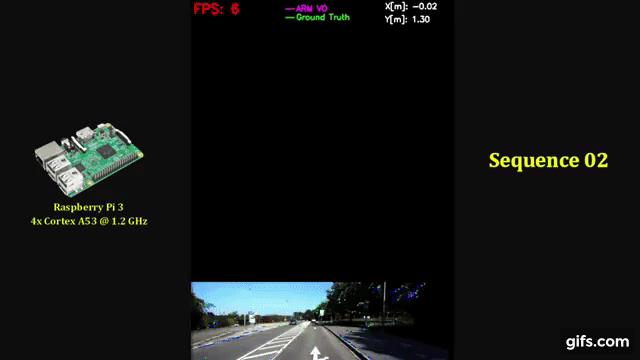Authors: Zana Zakaryaie Nejad and Ali Hosseininaveh
ARM-VO is an efficient monocular visual odometry algorithm designed for ARM processors. It uses NEON C intrinsics and multi-threading to accelerate keypoint detection and tracking. Check this video to see the performance on Raspberry Pi 3 and Odroid XU4.
- Cmake
- OpenCV (built with TBB)
- ROS (Optional)
git clone https://github.com/zanazakaryaie/ARM-VO.git
cd ARM-VO
cmake .
make
Download the odometry dataset from here. Open a terminal and type:
./ARM_VO pathToData paramsFileName
The ros node subscribes to "kitti/image" topic and publishes "arm_vo/pose" which is of type geometry_msg::Pose. To use the ROS node: Open a terminal and type:
cd ROS
catkin_make
source devel/setup.bash
rosrun ARM_VO ARM_VO paramsFileName
Now, open another terminal and type:
cd ROS
source devel/setup.bash
rosrun ARM_VO ImagePublisher pathToData
-
ARM-VO recovers the scale if the camera height and pitch angle are provided. Thus, it is not applicable for drones or hand-held cameras.
-
The algorithm detects small-inter frame translations and pure rotations using GRIC but it doesn't decompose the estimated homography matrix. Track is lost if the camera rotates too much without translation.
-
If you get low FPS, check your power adapter. Raspberry Pi 3 runs ARM-VO at 8 frames per second (averagelly) if powered up with a 5V-2A adapter.
-
If you use ARM-VO in an academic work, please cite:
@article{nejad2019arm,
title={ARM-VO: an efficient monocular visual odometry for ground vehicles on ARM CPUs},
author={Nejad, Zana Zakaryaie and Ahmadabadian, Ali Hosseininaveh},
journal={Machine Vision and Applications},
volume={30},
number={6},
pages={1061--1070},
year={2019},
publisher={Springer}
}
